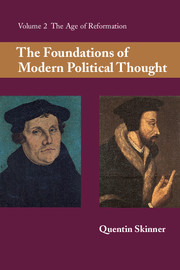Book contents
- Frontmatter
- Contents
- PART ONE ABSOLUTISM AND THE LUTHERAN REFORMATION
- PART TWO CONSTITUTIONALISM AND THE COUNTER REFORMATION
- 4 The background of constitutionalism
- 5 The revival of Thomism
- 6 The limits of constitutionalism
- Further Reading
- PART THREE CALVINISM AND THE THEORY OF REVOLUTION
- Conclusion
- Further Reading
- Bibliography of primary sources
- Bibliography of secondary sources
- Index
6 - The limits of constitutionalism
Published online by Cambridge University Press: 05 June 2012
- Frontmatter
- Contents
- PART ONE ABSOLUTISM AND THE LUTHERAN REFORMATION
- PART TWO CONSTITUTIONALISM AND THE COUNTER REFORMATION
- 4 The background of constitutionalism
- 5 The revival of Thomism
- 6 The limits of constitutionalism
- Further Reading
- PART THREE CALVINISM AND THE THEORY OF REVOLUTION
- Conclusion
- Further Reading
- Bibliography of primary sources
- Bibliography of secondary sources
- Index
Summary
THE RADICAL PERSPECTIVE
The Thomist philosophers of the counter-reformation have often been portrayed as the main founders of modern constitutionalist and even democratic thought. Suárez has been hailed as ‘the first modern democrat’, Bellarmine has been praised for revealing ‘the true sources of democracy’, and the Jesuits as a whole have been credited with ‘inventing’ the concept of the social contract and exploring for the first time its implications for the theory of justice. There is of course an element of truth in these claims. By drawing on their Thomist heritage, the counterreformation theorists not only arrived at a number of radically populist conclusions, but also served as the main channel through which the contractarian approach to the discussion of political obligation came to exercise its decisive influence in the course of the following century. If we glance forward, for example, to John Locke's Two Treatises of Government, we find him reiterating a number of the most central assumptions of the Jesuit and Dominican writers. He agrees with their analysis of the ius naturale, declaring that reason ‘is that law’ and that the same law must also be treated as ‘the will of God’ (pp. 289, 376). He agrees with their sense of the pivotal role which ought to be assigned to the ius naturale in any legitimate political society, describing it as ‘an eternal rule to all men’ and insisting that all the enactments of our legislators must be ‘conformable’ to its demands.
- Type
- Chapter
- Information
- The Foundations of Modern Political Thought , pp. 174 - 184Publisher: Cambridge University PressPrint publication year: 1978



